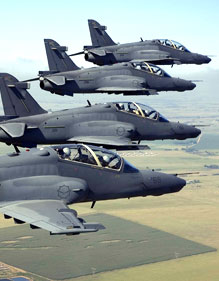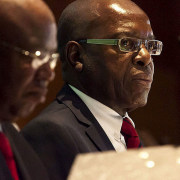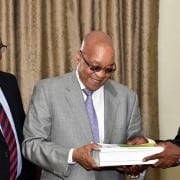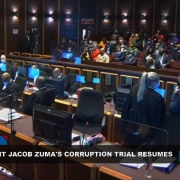|
Getting your Trinity Audio player ready...
|
 By Lee-Ann Alfreds
By Lee-Ann Alfreds
It helped bankrupt Greece, wiped out a multi-million rand education aid package to poverty-stricken Tanzania and robbed struggling South Africans of a potential 1.1-million jobs.
Yet such is the secrecy that surrounds the global arms industry that very few people are aware of the pernicious impact the international defence sector has on the lives of billions of ordinary people around the world.
For what is most notable about the $1.54-trillion industry is its corrupt nature. Transparency International (TI) lists the international arms trade as one of the three most corrupt businesses in the world along with oil and gas, and mining.
At least $20-billion is lost to corruption in the sector every year, TI estimated in 2010. It also noted that this estimate was modest, as corrupt activities are often hidden behind national security concerns.
“Single source contracts, unaccountable and overpaid agents, obscure defence budgets, unfair appointments and promotions, and many more forms of corruption in this secretive sector waste taxpayer funds and put citizens’ and soldiers' lives at risk,” stated TI.
One high-profile victim of the international arms trade is Greece. Thanks to heavy arms spending, Athens had to be rescued with EU and IMF bailouts totaling $328-billion in 2010 and 2012. These were accompanied by strict conditions that have greatly increased poverty and unemployment in the country. Greece’s deputy armaments chief later admitted in court to taking $16-million in bribes from foreign arms companies.
Tanzania too has fallen victim to the international arms trade, according to author Andrew Feinstein. In 2001, Tanzania was persuaded to buy an air radar system from BAE for £28-million, a system the UN’s International Civil Aviation Organisation later made clear would require the purchase of additional equipment to render it useful for civilian control. The amount spent on the air radar system, which was virtually obsolete when Tanzania took possession of it, was almost a third of the country’s basic national education expenditure and effectively wiped out a £35-million education aid package from the UK.
Former French president Nicolas Sarkozy, whose final days in office were overshadowed by the arrests and charging of two of his closest friends for alleged kickbacks on arms sales to Pakistan, is also a victim.
The ‘Karachi affair’ – billed by some as the biggest French corruption scandal since World War II – implicated Sarkozy’s friends in kickbacks from the sale of submarines to Pakistan in the 1990s, which were partially used to illegally fund a failed presidential campaign. But the Karachi saga went beyond illegal party funding. In May 2002, a bomb attack on a bus in the city killed 15 people, including 11 workers for a French naval defence company on their way to the dockyard to work on submarines that had been sold to Pakistan. French judges believed the attack was retaliation for unpaid government bribes.
SA’s arms deal a death blow to development
Another victim is South Africa, which has been badly hamstrung by the 1999 arms deal currently being investigated by the Arms Procurement Commission under way in Pretoria.
According to Feinstein – who describes the trade in weapons as a “parallel world of money, corruption, deceit and death” – the effect of the estimated R70-billion deal can be measured in lost lives, jobs and development.
“A Harvard University study conservatively estimated that, over the five years following the deal, 365 000 South Africans died avoidable deaths because the state, in thrall to Thabo Mbeki’s Aids denialism and fiscal discipline on everything but the purchase of unnecessary weapons, would not provide the antiretroviral medication they needed to live,” he wrote in The Shadow World.
“South Africa could have built close to 2-million houses with the money spent on weapons or employed 1.1-million maintenance workers and cleaners for a year – the equivalent of 100 000 jobs per year for ten years in a country with a formal unemployment rate of close to 30%.”
Feinstein’s contention is backed up by a 2007 report by IANSA, Oxfam, and Safeworld into the economic cost to Africa of armed conflict. The report found that armed conflict cost Africa, including South Africa, around $18-billion per year or shrunk an African nation’s economy by at least 15%, seriously derailing development.
“Economic activity falters or grinds to a halt,” the report, titled Africa’s Missing Billions, found. “Income from valuable natural resources ends up lining individual pockets rather than benefiting the country. The country suffers from inflation, debt, and reduced investment, while people suffer from unemployment, lack of public services, and trauma.”
Inflation, debt, reduced investment, unemployment and lack of public services … these are scenarios with which South Africans, who have first-hand experience of the international arms industry, have become all too familiar.









